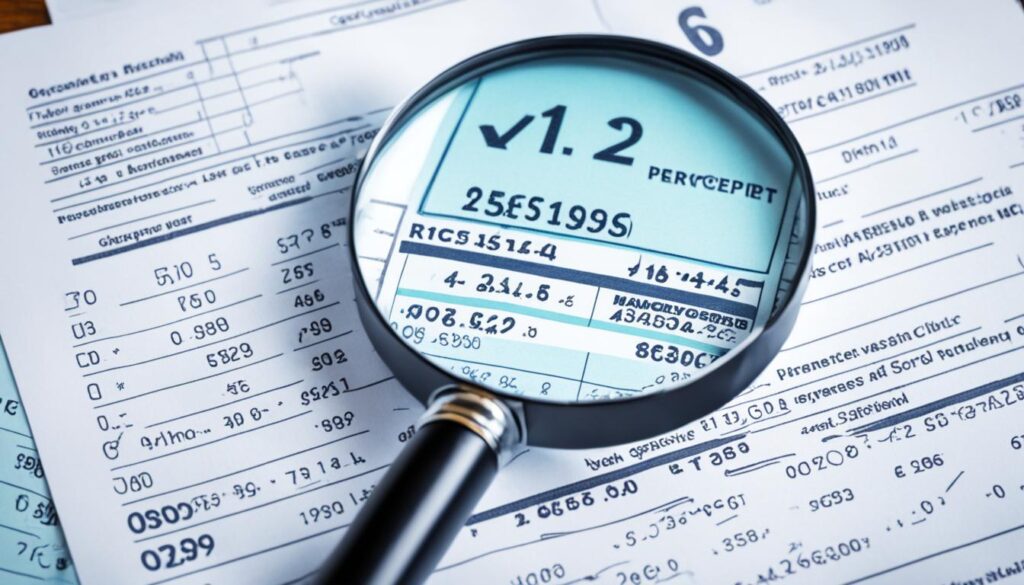Picture this: You’re a small business owner named Sarah, and you’ve just launched your online store. Excitement fills the air as you start receiving orders and watching your sales grow. But amidst the celebrations, you soon realize that there’s a cost to accepting payments through Stripe, your reliable payment processing platform. As the transaction fees start piling up, you wonder if there’s a silver lining to this financial cloud.
Understanding the tax implications of payment processing fees is crucial for small business owners like Sarah. Is she able to write off these fees as a tax deduction? Can they help reduce her taxable income and save her some hard-earned money? Let’s dive into the world of tax deductions and explore whether Stripe fees are indeed tax deductible.
- Payment processing fees are generally tax-deductible business expenses.
- Stripe fees can fall under the category of “bank fees” on tax forms.
- Accurate recordkeeping is crucial for deducting payment processing fees.
- Consulting with a tax professional can provide personalized guidance on maximizing deductions.
- Understanding Stripe’s fee structure and reconciling tax reporting is essential for accurate filings.
Understanding Payment Processing Fees
Payment processing fees are an essential part of conducting business online. When you accept payments from customers, there are costs involved in facilitating those transactions. These fees, also known as merchant fees, play a crucial role in enabling smooth and secure payment processing.
Payment processing fees consist of various components that contribute to the overall cost. Let’s break down some of the key fees:
- Interchange Fees: These are fees charged by the issuing bank for processing each transaction. They are set by the card networks, such as Visa, Mastercard, or American Express, and are a percentage of the transaction amount.
- Assessment Fees: Card networks charge assessment fees for the privilege of using their payment infrastructure. These fees cover the network’s operational costs and are typically a small percentage of the transaction value.
- Processor Markup: Payment processors, such as Stripe, charge a markup fee for their services. This fee covers the cost of processing payments, providing customer support, and maintaining the necessary technology infrastructure.
In addition to these primary fees, payment processors may also charge additional fees for specific services. These can include:
- Chargeback Handling Fees
- Payment Gateway Access Fees
- PCI Compliance Fees
The exact amount of these fees can vary based on factors such as the type of transaction, the type of card used, and the nature of your business.
To give you a better understanding, here is an infographic showcasing the breakdown of payment processing fees:
By comprehending the different payment processing fees, you can make informed decisions about which payment processor to choose and understand the impact these fees may have on your bottom line.
Tax Deductibility of Payment Processing Fees
When it comes to running a business, payment processing fees are an unavoidable expense. But did you know that these fees can be tax-deductible? That’s right, the IRS recognizes payment processing fees as a deductible business expense, allowing you to reduce your taxable income and potentially save on taxes. In fact, IRS Publication 535 provides guidance on what can be considered deductible business expenses, and payment processing fees typically fall under the category of “bank fees” on tax forms.
To understand why payment processing fees are tax-deductible, it’s important to delve into the concept of deductible business expenses. The IRS defines a deductible business expense as one that is both ordinary and necessary. Ordinary expenses are common and accepted in a particular trade or business, while necessary expenses are helpful and appropriate for the trade or business.
Payment processing fees fulfill both of these criteria. They are ordinary expenses because businesses across various industries incur them as a standard part of accepting payments. They are also necessary expenses because without payment processing services, businesses would be unable to efficiently process transactions and collect revenue.
By deducting payment processing fees as a business expense, you can lower your taxable income and potentially reduce the amount of taxes you owe. This can result in significant savings, allowing you to invest more into growing your business or boosting your bottom line.
To ensure you’re taking full advantage of the tax deductibility of payment processing fees, it’s essential to keep accurate records. This includes retaining invoices, receipts, and other supporting documentation that show the fees paid to substantiate your deductions. By maintaining detailed records, you’ll have the necessary evidence in case of an audit and ensure compliance with tax regulations.
Remember, it’s always a good idea to consult with a tax professional or accountant who specializes in business taxes to get personalized guidance and ensure you’re maximizing your deductions. They can provide valuable insights based on your specific business situation and help you navigate the intricacies of the IRS tax code.

Benefits of Deducting Payment Processing Fees:
- Reduces taxable income
- Increases potential tax savings
- Allows you to invest more in business growth
- Provides opportunities to boost your bottom line
By understanding the tax deductibility of payment processing fees, you can leverage this opportunity to optimize your business finances and keep more money in your pocket.
Deducting Transaction Fees
When it comes to your business finances, every penny counts. That’s why it’s important to explore all avenues for reducing taxable income and maximizing your deductions. One area that often goes overlooked is transaction fees incurred through payment processors. These fees can add up over time, but the good news is that they are generally tax-deductible as ordinary and necessary expenses directly related to your business operations.
By deducting transaction fees, you can potentially lower your taxable income, which in turn can result in substantial tax savings. This means more money in your pocket to invest back into your business or use as you see fit. However, it’s important to note that accurate recordkeeping is crucial when it comes to deducting transaction fees.
Accurate recordkeeping involves maintaining a comprehensive trail of invoices, receipts, and statements provided by your payment processor. These documents serve as evidence of the fees you have paid and will substantiate your deductions in case of an audit. Keeping organized records not only ensures compliance with tax regulations but also makes the process smoother and less stressful when it comes time to file your tax return.
To give you a visual representation of the importance of deducting transaction fees and how it can impact your taxable income, let’s take a look at this hypothetical table:
| Month | Total Sales | Transaction Fees | Taxable Income (Without Deductions) | Taxable Income (With Deductions) |
|---|---|---|---|---|
| January | $10,000 | $300 | $10,000 | $9,700 |
| February | $8,500 | $250 | $8,500 | $8,250 |
| March | $12,000 | $400 | $12,000 | $11,600 |
This table illustrates how deducting transaction fees can reduce your taxable income and potentially save you money on taxes. As you can see, even small deductions can make a significant difference over time. By accurately recording and deducting your transaction fees, you can keep more of your hard-earned money in your own pocket.
Remember, consult with a tax professional or accountant who specializes in business taxes to ensure you are following the appropriate guidelines and maximizing your deductions effectively. Their expertise can provide valuable insights and help you navigate the complexities of tax deductions and accurate recordkeeping.
Tax Deductibility of Merchant Fees
When it comes to running a business, merchant fees are an unavoidable expense. But did you know that these fees can actually be tax-deductible? That’s right! Merchant fees are considered deductible business expenses, making them an essential part of your tax strategy. By deducting these fees, you can reduce your taxable income and increase your overall tax savings.
Merchant fees are classified as ordinary and necessary expenses directly associated with your business operations. As such, they meet the criteria set by the IRS for deductible business expenses. However, it’s important to note that you need to maintain accurate records of these fees to support your deductions in case of a tax audit.
To ensure that your merchant fees are tax-deductible, be sure to keep track of any invoices, receipts, or statements provided by your payment processor. These records will serve as proof of the fees you’ve paid and substantiate your deductions. By maintaining meticulous records, you can navigate tax season with confidence and ensure that you’re maximizing your deductions.
Here’s an example of how you can keep track of your merchant fees:
| Date | Payment Processor | Invoice/Receipt Number | Amount |
|---|---|---|---|
| 2022-01-15 | Stripe | INV123456 | $50.00 |
| 2022-02-02 | PayPal | REC789012 | $35.00 |
| 2022-03-10 | Square | INV345678 | $40.00 |
By maintaining records like these, you’ll have the necessary documentation to support your tax deductions and demonstrate that your merchant fees are legitimate business expenses. So, don’t overlook the tax benefits of merchant fees and make sure to keep those records organized!
Best Practices for Deducting Payment Processing Fees
When it comes to deducting payment processing fees on your taxes, following best practices can ensure a smooth filing process and maximize your deductions. Here are some essential tips to consider:
- Accurate Recordkeeping: Keep a record of all invoices, receipts, and other supporting documentation related to payment processing fees. This documentation will help substantiate your deductions and provide evidence of the fees paid.
- Separate Business and Personal Expenses: It’s crucial to separate your business and personal expenses when deducting payment processing fees. Only deduct fees that are directly associated with your business operations, not personal expenses.
- Use Appropriate Tax Forms and Categories: When reporting payment processing fees, make sure to use the appropriate tax forms and categories. This will help ensure that your deductions are reported correctly and minimize the risk of errors or audits.
- Consult with a Tax Professional: To navigate the complexities of tax deductions and ensure compliance with tax regulations, it’s advisable to consult with a tax professional or accountant who specializes in business taxes. They can provide personalized guidance based on your specific circumstances and help you make the most of your deductions.
By adhering to these best practices, you can deduct payment processing fees accurately and increase your tax savings. Remember, accurate recordkeeping and consulting with a tax professional are key to maximizing your deductions while staying compliant with tax laws.
To better illustrate the importance of best practices in deducting payment processing fees, refer to the table below:
| Best Practice | Benefits |
|---|---|
| Accurate Recordkeeping | Substantiate deductions and provide evidence of fees paid |
| Separate Business and Personal Expenses | Ensure only business-related fees are deducted |
| Use Appropriate Tax Forms and Categories | Report deductions correctly and avoid errors |
| Consult with a Tax Professional | Receive personalized guidance and ensure compliance |

Understanding Stripe’s Fee Structure and Tax Reporting
When it comes to Stripe fees and tax reporting, it’s essential to have a clear understanding of how it all works. Stripe’s fee structure may vary depending on the type of transaction you are processing, whether it’s online payments or in-person payments. These fees are deducted from the total amount before it is deposited into your business account. So, it’s important to account for these fees when managing your finances.
At the end of the calendar year, Stripe provides you with a 1099-K form, which summarizes the sales activity of your account. It’s important to note that you must report the full total of your sales before the fees are subtracted for tax purposes. This ensures accurate reporting and compliance with tax regulations.
To ensure proper tax reporting, it is crucial to reconcile the 1099-K form with your own records. This includes keeping track of Stripe fees, as well as any refunds or adjustments that may have occurred throughout the year. By keeping meticulous records and accurately reconciling your transactions, you can ensure that your tax reporting is accurate and complete.
In case you encounter any discrepancies or need to cross-reference your data, Stripe allows you to export transaction data from your Stripe Dashboard. This helps with the reconciliation process and ensures that you have all the necessary information at hand for tax reporting purposes.








